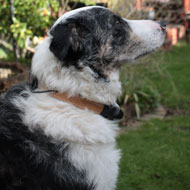
Vets study the effect of medication on dogs with osteoathritis
GPS technology could be used by vets to monitor the effects of certain medications. In a recent study, Edinburgh vets used GPS collars to determine the effects of painkillers in dogs with osteoarthritis.
Using the technology, vets from the Royal (Dick) School of Veterinary Studies were able to compare the movements of healthy dogs, to those of dogs with osteoarthritis.
According to their findings, published in the journal PLOS One, dogs treated with the anti-inflammatory painkiller Carprofen could run in nearly the same way as healthy dogs.
Lead researcher Dr Dylan Clements, said: "GPS collars have given us an insight into the levels of physical performance dogs exhibit during their normal daily activities, and show us how much we can alter a dog’s performance by keeping them on or off a lead, or playing with them.
"We found that they were a sensitive way for us to measure how well dogs recover from a disease that affects activity, such as osteoarthritis. We hope to be able to use the collars to understand more about how activity might contribute to or help prevent diseases in the future."
The collars allowed vets to monitor how quickly the dogs moved and changed speed, as well as how far they travelled during their normal exercise regime.
According to data collected from the collars, the dogs with osteoarthritis were able to run as quickly as healthy dogs, but their condition significantly affected their ability to speed up and slow down.
When they were treated with Carprofen, however, their performance improved to a level comparable to that of the healthy dogs for most of the measures taken during the study.
To view the research, visit: http://journals.plos.org/plosone/article?id=10.1371/journal.pone.0117094
Image © Dr Stephen Ellwood, Royal (Dick) School of Veterinary Studies



 The veterinary mental health charity Vetlife is inviting the veterinary community to join it for a sponsored cold-water dip.
The veterinary mental health charity Vetlife is inviting the veterinary community to join it for a sponsored cold-water dip.